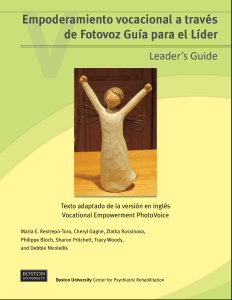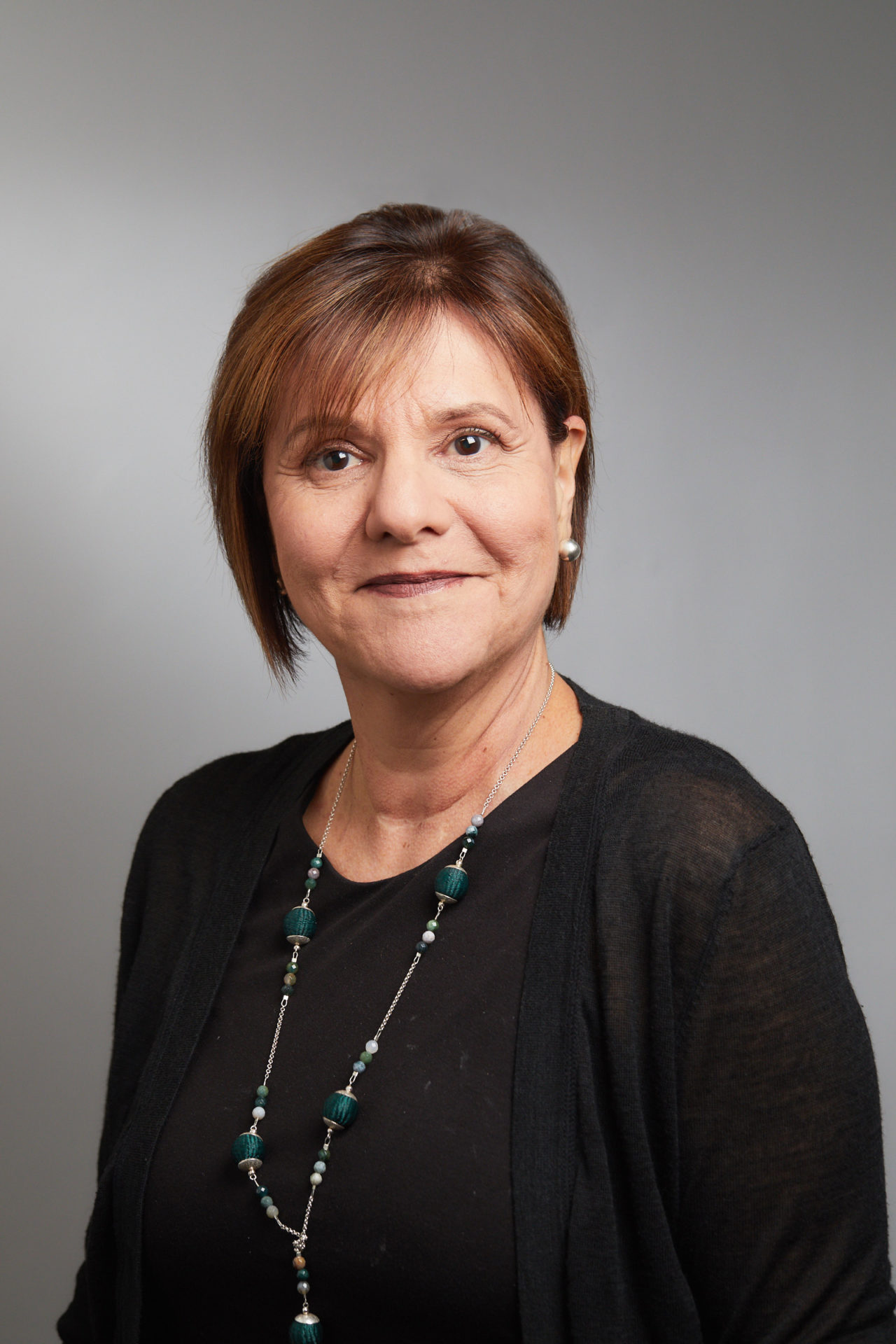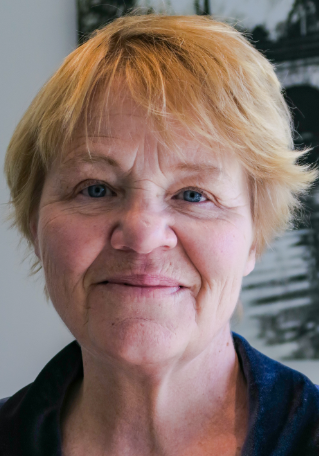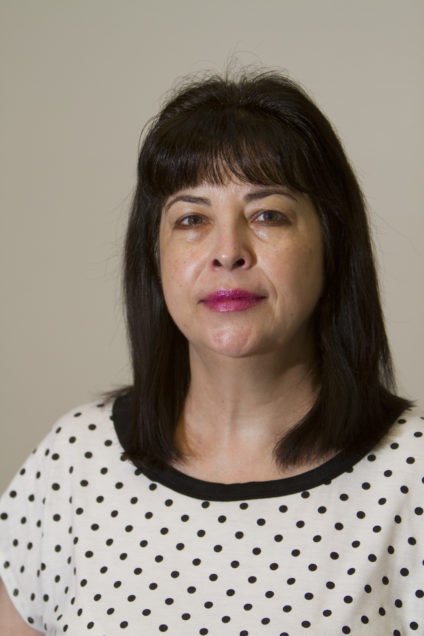Empoderamiento vocacional a través de Fotovoz
Marie E. Restrepo-Toro, Cheryl Gagne, Zlatka Russinova, Philippe Bloch, Sharon Pritchett, Tracy Woods y Debbie Nicolellis

Curriculum / Workbook (PDF)
$19.97
Was: $39.95
Empoderamiento vocacional a través de Fotovoz
Marie E. Restrepo-Toro, Cheryl Gagne, Zlatka Russinova, Philippe Bloch, Sharon Pritchett, Tracy Woods y Debbie Nicolellis
$19.97
Was: $39.95
Audience
Público objetivo:
El contenido del currículo de Empoderamiento vocacional a través de Fotovoz puede resultar útil para administradores, coordinadores de programas, supervisores, proveedores de salud y personal de grupos de apoyo de pares, en sus labores para apoyar las aspiraciones vocacionales de personas en recuperación.
Additional Materials for Purchase
Description
El propósito del programa de Empoderamiento Vocacional a través de Fotovoz (VEP, por sus siglas en inglés) es ayudar a las personas a pensar acerca de trabajar, y de esta manera empoderarles para establecer metas profesionales. Para muchas personas con un diagnóstico de enfermedad mental grave es difícil imaginar poder trabajar. Puede parecer que existen demasiadas barreras y que es difícil saber por dónde empezar. Este programa invitará a los participantes a considerar seguir una vida profesional significativa.
El empoderamiento vocacional consiste en sentir confianza en la capacidad de uno mismo para obtener y mantener un trabajo. Fotovoz es una manera en la que un individuo o un grupo de individuos pueden captar fortalezas, problemas o preocupaciones al combinar fotografías con textos escritos. Las fotografías y los textos escritos son utilizados en discusiones de grupo para ayudar a las personas a reflexionar sobre sí mismas y sus situaciones, de una manera positiva que eduque e incremente su confianza.
El currículo incluye dos libros: la Guía para el Líder y la Guía para los participantes. Para cada sesión de clases hay una lección detallada para seguir en la Guía para el Líder y una sección para ser utilizada conjuntamente por los participantes en la Guía para participantes. El grupo está diseñado como una clase interactiva, dinámica, con varios componentes, y para ser dirigida por líderes de pares con amplia experiencia en Empoderamiento Vocacional a través de Fotovoz. Cada participante necesitará tener la Guía para participantes junto con un lápiz o bolígrafo para escribir durante las sesiones de Fotovoz.
En la Guía para el Líder para cada sesión de grupo se incluyen cinco secciones:
- Un resumen de la sesión
- Una programación de entrenamiento por cada módulo
- Antecedentes del contenido de la sesión
- Una lista de los materiales o suministros necesarios para cada sesión
- El plan de la sesión
Diseñado para utilizar con Capacitación y entrenamiento por parte del Centro de Rehabilitación Psiquiátrica (Center for Psychiatric Rehabilitation)
Se recomienda que el currículo de Empoderamiento Vocacional a través de Fotovoz se combine con la implementación y capacitación técnica de nuestros instructores del Centro de Rehabilitación Psiquiátrica. Si está interesado en una Consulta de Capacitación/Entrenamiento para saber cómo utilizar mejor estos materiales de entrenamiento profesional en su agencia o programa, por favor contacte a: psyrehab@bu.edu
Citation: Restrepo-Toro, M. E., Gagne, C., Russinova, Z., Bloch, P., Pritchett, S., Woods, T., & Nicolellis, D. (2015). Empoderamiento vocacional a través de Fotovoz: Guia para el Lider. Boston, MA: Boston University, Center for Psychiatric Rehabilitation.
Product Details
la Guía para el Líder:
PDF file: 57 páginas
Publicado: 2015
ISBN: 978-1-878512-62-8
la Guía para los Participantes:
PDF file: 62 páginas
Publicado: 2015
ISBN: 978-1-878512-61-1
Table of Contents
Guía para el Lider
- Introducción para Líderes de Grupos ntecedentes del Currículo
- Cómo utilizar el currículo xhibición de Fotografías
- Plan de lección 1: Introducción al empoderamiento vocacional a través de Fotovoz
- Plan de lección 2: Mi vida laboral
- Plan de lección 3: Escribir narraciones de Fotovoz
- Plan de lección 4: Mis valores vocacionales
- Plan de lección 5: Mi identidad vocacional
- Plan de lección 6: Beneficios y costos de la vida laboral (Parte 1)
- Plan de lección 7: Beneficios y costos de la vida laboral (Parte 2)1)
- Plan de lección 8: Servicios vocacionales y apoyos1)
- Plan de lección 9: Establecermetas1)
- Plan de lección 10: Completar la travesía vocacional
Guía para los participantes
- Unidad 1: Introducción al empoderamiento vocacional a través de Fotovoz
- Unidad 2: Mivida laboral
- Unidad 3: Escribir narraciones de Fotovoz
- Unidad 4: Mis valores vocacionales
- Unidad 5: Mi identidad vocacional
- Unidad 6: Beneficios y costos de la vida laboral (Parte 1)
- Unidad 7: Beneficios y Costos de la vida laboral (Parte 2)
- Unidad 8: Servicios vocacionales y apoyos
- Unidad 9: Establecer metas
- Unidad 10: Completar la travesía vocacional
Authors
Reviews
Currently, there are no published reviews for this book. If you would like to write an endorsement, please send it to: cprbooks@bu.edu




